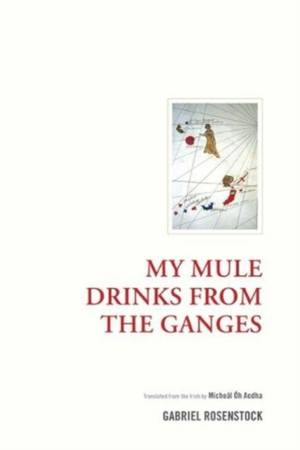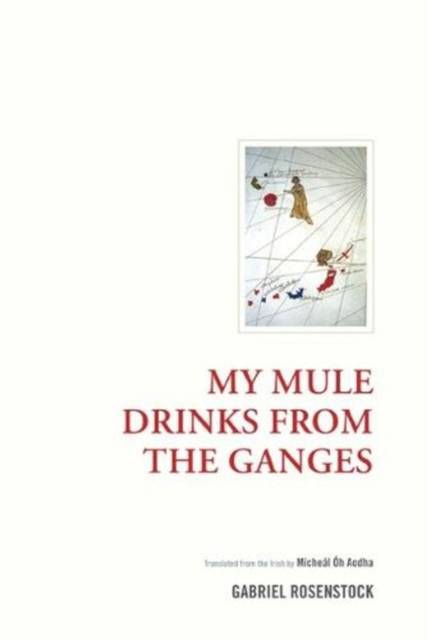
Je cadeautjes zeker op tijd in huis hebben voor de feestdagen? Kom langs in onze winkels en vind het perfecte geschenk!
- Afhalen na 1 uur in een winkel met voorraad
- Gratis thuislevering in België vanaf € 30
- Ruim aanbod met 7 miljoen producten
Je cadeautjes zeker op tijd in huis hebben voor de feestdagen? Kom langs in onze winkels en vind het perfecte geschenk!
- Afhalen na 1 uur in een winkel met voorraad
- Gratis thuislevering in België vanaf € 30
- Ruim aanbod met 7 miljoen producten
Zoeken
€ 46,45
+ 92 punten
Omschrijving
This book usurps the tradition of travel writing as practiced with respect to Ireland in recent decades. While the vast majority of Irish travelogues continue to be written in English, this travelogue was originally written in Irish and is here made available to the Anglophone world for the first time. This book links with a long tradition of travel writing as published in the Irish language. My Mule Drinks from the Ganges is a fascinating travelogue that reclaims one of the oldest traditions in Irish culture - the tradition of the "immrama" - for a new generation of readers. The author and is wife have visited India almost every year for some years with Kerala and Benares being of special interest. "Somebody once said that 'Joyce has made of this river the Ganges of the literary world, ' but sometimes the smell of the Ganges of the literary world is not all that literary." Brendan Behan, Confessions of an Irish Rebel. As with its European neighbours, Ireland is home to a number of festivals which celebrate the art of travel writing, the annual Lismore Festival of Travel Writing in County Waterford for example. The modern genre of travel writing as practiced by Irish writers is very different to much of what passed for travel writing in Ireland, until very recently. In the colonial context that defined Irish history and culture prior to the last century, travel writing was frequently viewed an adjunct to the "all-knowing" imperial gaze.It was an element in that tradition which sought to know, to define and to categorize peoples and their places. It was part of the "ordering" process that was the colonial project. It was a celebration of "knowing" which we now realize was frequently a charade. In many cases, as with the travel accounts produced by members of the colonial class in Eastern Europe or Asia, these descriptions of other peoples and cultures were produced in accordance with an inherited and (sometimes-exoticized) tradition or "episteme" as littered with cliché and stereotype. In many cases the writers or hobbyists in question knew next to nothing about the people they were describing; they frequently had only the vaguest knowledge concerning the cultures or languages that they were "classifying". This book usurps this tradition. While the vast majority of Irish travelogues as written in the past two centuries were written in English, this travelogue was written (and published originally) in Irish before later being translated and re-shaped in English . Gabriel Rosenstock (b.1949)is the author/translator of over 100 books, including 12 volumes of poetry in Irish and a number of volumes of bilingual haiku. A member of Aosdana, the Irish Academy of Arts and Letters. He has given readings in Europe, the United States, India, Australia and Japan. Rosenstock has translated into Irish the selected poems of, among others, Francisco X. Alacron, Seamus Heaney, Gunter Grass, W M Roggeman, Said, M. Augustin, P. Huchel, Georg Trakl, G. Heym, H. Schertenleib and his Irish-language versions of the haiku masters Issa, Buson, Shiki, Santoka and others are much loved in Ireland. Translator: Dr. Mícheál Ó hAodha lectures in the Department of History, University of Limerick. He has published widely on Irish migration, the Irish diaspora, social geography and oral history. His books include "American 'Outsider' Stories from the Irish Traveler Diaspora" (2007, with T.J. Vernon), "'The Turn of the Hand' A Memoir from the Irish Margins" (2010, with Mary Ward) and "'On the Run' The Diary of an Irish Republican" (2011, with Ruan O'Donnell). His forthcoming study with Academica/Maunsel&Co deals with circuses, shows, showmen and performers in the West of Ireland in the early 20th century and will be published in 2012.
Specificaties
Betrokkenen
- Auteur(s):
- Vertaler(s):
- Uitgeverij:
Inhoud
- Aantal bladzijden:
- 264
- Taal:
- Engels
- Reeks:
Eigenschappen
- Productcode (EAN):
- 9781936320486
- Verschijningsdatum:
- 1/04/2012
- Uitvoering:
- Paperback
- Formaat:
- Trade paperback (VS)
- Afmetingen:
- 150 mm x 226 mm
- Gewicht:
- 204 g

Alleen bij Standaard Boekhandel
+ 92 punten op je klantenkaart van Standaard Boekhandel
Beoordelingen
We publiceren alleen reviews die voldoen aan de voorwaarden voor reviews. Bekijk onze voorwaarden voor reviews.









